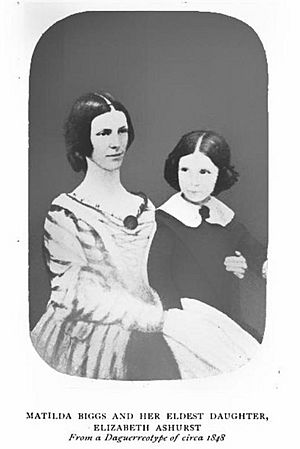Elizabeth Ashurst Biggs facts for kids
Elizabeth Ashurst Biggs (born in 1838 – died on 21 November 1905) was an English writer. She wrote novels and worked hard for women's rights. She also spoke out against slavery.
Early Life and Family
Elizabeth Ashurst Biggs was born in Leicester, England, in 1838. Her grandfather, William Henry Ashurst, was a well-known lawyer. Her parents were Matilda Ashurst Biggs and Joseph Biggs.
Even as a young child, Elizabeth learned about important issues. Her aunt, Eliza Ashurst, once gave her a penny. She told Elizabeth to donate it to help "knock down the Corn Laws." This meant making bread cheaper for everyone. Elizabeth learned this lesson with great feeling. This early start helped her become a person who cared deeply about national and international matters.
A Family of Writers
Elizabeth's family had a strong tradition of writing. Her aunt, Eliza Ashurst Bardonneau-Narcy, was one of the first to translate books by George Sand into English. Another aunt, Emilie Ashurst Venturi, translated writings by Giuseppe Mazzini. She also wrote essays about Italian nationalism.
Elizabeth's younger sisters also became writers. Caroline Ashurst Biggs edited a famous newspaper for women, The Englishwoman's Review. She wrote often about women's rights. Maude Ashurst Biggs translated Polish books into English. She also wrote many articles for The Englishwoman's Review. Kate Ada Ashurst Biggs wrote articles for The Gentleman's Magazine. Elizabeth continued this family tradition with her own novels.
Her Important Books
Elizabeth Ashurst Biggs wrote two novels, but she did not use her real name. Susan B. Anthony, a famous American women's rights leader, said Elizabeth wrote White and Black: A Story of the Southern States (1862). This book was about people living in the American South before the Civil War. It strongly argued against slavery. The story showed how slavery harmed both enslaved people and slave owners.
In 1874, Elizabeth published her second novel, Waiting for Tidings. She again used "by the author of White and Black" instead of her name. This book told the story of a woman named May Cressingham. It showed the problems British women faced in the late 1800s. Back then, laws often gave all a woman's property to her husband. The novel openly argued for women to have equal rights under the law. It also hinted that women should be allowed to vote.
Some people thought Elizabeth's sister Caroline might have written these books. However, it seems more likely that Elizabeth wrote both. Obituaries for Caroline mentioned other books she wrote, but not White and Black or Waiting for Tidings.
Personal Life
Elizabeth Ashurst Biggs was friends with Giuseppe Mazzini, a close friend of her mother. He called her "Lizzie" and "Ashurst." She received letters and gifts from him until he passed away. In 1850-1851, Elizabeth's family lived in Genoa, Italy, for several months. This experience influenced her writing. Her books often mention Italy, and part of Waiting for Tidings takes place on the Italian coast.
Elizabeth never married. She lived with her father and sisters her whole life. She passed away on 21 November 1905, at the age of 67. She was living at the family home in Hampstead, London, at the time.
 | Lonnie Johnson |
 | Granville Woods |
 | Lewis Howard Latimer |
 | James West |


